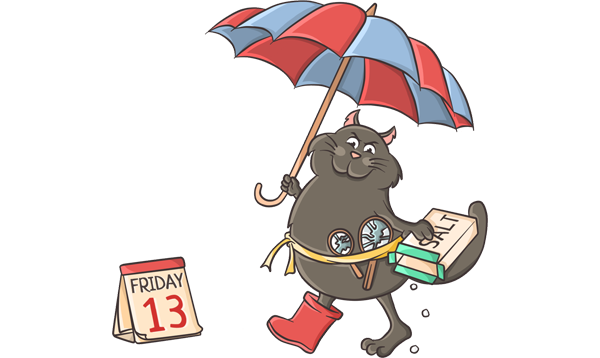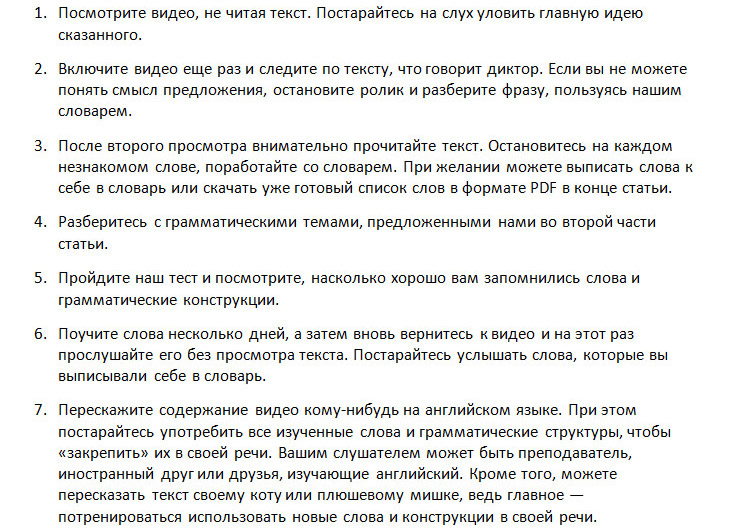
Видео рассчитано на уровень Intermediate.
Перед просмотром советуем почитать инструкцию о том, как пользоваться этой статьей, чтобы она принесла наибольший эффект.

Видео: Where do superstitions come from? — Откуда берутся суеверия?
| Текст | Словосочетания |
|---|---|
| Are you afraid of black cats? Would you open an umbrella indoors? And how do you feel about the number thirteen? Whether or not you believe in them, you're probably familiar with a few of these superstitions. So how did it happen that people all over the world knock on wood, or avoid stepping on sidewalk cracks? | familiar — знакомый, известный a few — несколько, некоторые a superstition — суеверие to knock — стучать to avoid — избегать to step — ступать, шагать a sidewalk — тротуар a crack — трещина |
| Well, although they have no basis in science, many of these weirdly specific beliefs and practices do have equally weird and specific origins. Because they involve supernatural causes, it's no surprise that many superstitions are based in religion. | although — хотя, несмотря на science — наука weirdly — причудливо, необычно specific — определенный a belief — поверье equally — в равной степени origins — корни, истоки to involve — подразумевать, влечь за собой supernatural — сверхъестественный a cause — причина |
| For example, the number thirteen was associated with the biblical Last Supper, where Jesus Christ dined with his twelve disciples just before being arrested and crucified. The resulting idea that having thirteen people at a table was bad luck eventually expanded into thirteen being an unlucky number in general. Now, this fear of the number thirteen, called triskaidekaphobia, is so common that many buildings around the world skip the thirteenth floor, with the numbers going straight from twelve to fourteen. | to be associated — ассоциироваться, быть тесно связанным biblical — библейский the Last Supper — Тайная Вечеря Jesus Christ — Иисус Христос a disciple — апостол, ученик to crucify — распять resulting — вытекающий из этого bad luck — плохая примета, дурной знак eventually — в итоге, в результате to expand — развиться unlucky — несчастливый, злополучный fear — страх triskaidekaphobia /ˌtrɪskʌɪdɛkə'fəʊbɪə/ — боязнь числа тринадцать common — распространенный to skip — пропускать straight — прямо |
| Of course, many people consider the story of the Last Supper to be true but other superstitions come from religious traditions that few people believe in or even remember. Knocking on wood is thought to come from the folklore of the ancient Indo-Europeans or possibly people who predated them who believed that trees were home to various spirits. Touching a tree would invoke the protection or blessing of the spirit within. And somehow, this tradition survived long after belief in these spirits had faded away. | to consider — считать, полагать few — мало, немного folklore — фольклор ancient — древний to predate — существовать ранее, предшествовать various — различный a spirit — дух to invoke — вызвать blessing — благословение to survive — выжить, пережить to fade away — постепенно исчезнуть, сойти на нет |
| Many superstitions common today in countries from Russia to Ireland are thought to be remnants of the pagan religions that Christianity replaced. But not all superstitions are religious. Some are just based on unfortunate coincidences and associations. | a remnant — пережиток pagan — языческий to replace — заменить, вытеснить unfortunate — неудачный, злосчастный a coincidence — совпадение, стечение обстоятельств |
| For example, many Italians fear the number 17 because the Roman numeral XVII can be rearranged to form the word “vixi”, meaning “my life had ended”. Similarly, the word for the number four sounds almost identical to the word for death in Cantonese, as well as languages like Japanese and Korean that have borrowed Chinese numerals. And since the number one also sounds like the word for must, the number fourteen sounds like the phrase must die. That's a lot of numbers for elevators and international hotels to avoid. | Roman — римский a numeral — число to rearrange — перегруппировать, поменять местами similarly — подобным образом, аналогично Cantonese — кантонский (диалект китайского языка) to borrow — заимствовать an elevator — лифт |
| And believe it or not, some superstitions actually make sense, or at least they did until we forgot their original purpose. For example, theater scenery used to consist of large painted backdrops, raised and lowered by stagehands who would whistle to signal each other. Absent-minded whistles from other people could cause an accident. But the taboo against whistling backstage still exists today, long after the stagehands started using radio headsets. | to make sense — иметь смысл, быть логичным a purpose — цель, замысел scenery — декорации a backdrop — задний фон to raise — поднимать to lower — опускать a stagehand — рабочий сцены to whistle — свистеть absent-minded — рассеянный to cause — стать причиной, спровоцировать an accident — несчастный случай a taboo — запрет backstage — за кулисами, за сценой a radio headset — радиогарнитура |
| Along the same lines, lighting three cigarettes from the same match really could cause bad luck if you were a soldier in a foxhole where keeping a match lit too long could draw attention from an enemy sniper. Most smokers no longer have to worry about snipers, but the superstition lives on. | along the same lines — так же, аналогично, по той же схеме a match — спичка a foxhole — окоп to draw attention — привлечь внимание an enemy — враг a sniper — снайпер, стрелок a smoker — курильщик to worry — беспокоиться to live on — продолжать существовать |
| So why do people cling to these bits of forgotten religions, coincidences, and outdated advice? Aren't they being totally irrational? Well, yes, but for many people, superstitions are based more on cultural habit than conscious belief. After all, no one is born knowing to avoid walking under ladders or whistling indoors, but if you grow up being told by your family to avoid these things, chances are they'll make you uncomfortable, even after you logically understand that nothing bad will happen. And since doing something like knocking on wood doesn't require much effort, following the superstition is often easier than consciously resisting it. | to cling — цепляться, придерживаться bits — крупицы, остатки outdated — устаревший, запоздалый advice — совет irrational — нерациональный, нелогичный a habit — обычай, привычка conscious belief — сознательное убеждение, вера a ladder — лестница to grow up — расти to require — требовать an effort — усилие to follow — следовать to resist — сопротивляться |
| Besides, superstitions often do seem to work. Maybe you remember hitting a home run while wearing your lucky socks. This is just our psychological bias at work. You're far less likely to remember all the times you struck out while wearing the same socks. But believing that they work could actually make you play better by giving you the illusion of having greater control over events. So in situations where that confidence can make a difference, like sports, those crazy superstitions might not be so crazy after all. | besides — кроме того, вдобавок к тому to seem — казаться to hit a home run — произвести сильный и точный удар битой по мячу (термин из бейсбола) to wear — носить psychological bias — психологическая установка at work — в действии struck out (от to strike out) — промазать в трех подачах мяча подряд (термин из бейсбола) same — тот же самый actually — действительно, на самом деле confidence — уверенность to make a difference — изменить ситуацию, сыграть роль |
Грамматическое прошлое суеверий
В видео часто встречается простое прошедшее время (Past Simple). С его помощью мы говорим о факте, нескольких событиях или повторяющихся действиях, имевших место в прошлом.
Утверждение
Чтобы образовать утвердительную форму Past Simple, для начала надо определить, правильный глагол или нет. Список неправильных глаголов представлен в нашей таблице. Если нужный глагол находится в этом списке, то для построения предложения используем 2-ю форму глагола. Если же глагол правильный, мы добавляем к нему окончание -ed.
Посмотрите примеры из видео:
People believed that trees were home to various spirits. — Люди верили, что в деревьях обитают разные духи.
This tradition survived long after belief in these spirits had faded away. — Эта традиция надолго пережила давно исчезнувшую веру в духов.
Some superstitions actually make sense, or at least they did until we forgot their original purpose. — Некоторые суеверия действительно имеют смысл. Или, по крайней мере, имели до тех пор, пока мы не забыли их первоначальное назначение.
Отрицание
При отрицании появляются вспомогательный глагол did и частица not (в сокращенной форме — didn’t). В английском предложении только один глагол может стоять в прошедшем времени. Поэтому, как только появляется did, основной глагол принимает форму инфинитива без частицы to (did not go, did not believe, didn’t feel).
Примеры из видео в отрицательной форме выглядят следующим образом:
People didn’t believe that trees were home to various spirits. — Люди не верили, что в деревьях обитают разные духи.
This tradition did not survive long after belief in these spirits had faded away. — Эта традиция долго не просуществовала, после того как ушла вера в этих духов.
Вопрос
В вопросе на первое место мы ставим вспомогательный глагол did, затем подлежащее, а после него — основной глагол.
So how did it happen that people all over the world knock on wood? — Как же так получилось, что люди во всем мире стучат по дереву?
Did people believe that trees were home to various spirits? — Люди верили, что в деревьях обитают разные духи?
Did this tradition survive long after belief in these spirits had faded away? — Разве эта традиция пережила давно исчезнувшую веру в духов?
Could
В видео вы также можете заметить модальный глагол can (уметь, мочь) в прошедшей форме could (мог). Если вы хотите сказать, что кто-то мог что-то сделать в прошлом, используйте could.
Absent-minded whistles from other people could cause an accident. — Случайный свист мог привести к несчастному случаю.
Believing that your lucky socks work could actually make you play better. — Вера в силу ваших счастливых носков могла и правда заставить вас лучше играть.
Подробно обо всех случаях употребления Past Simple читайте в нашей статье. Если вы хотите потренироваться в употреблении Past Simple и 11 других времен, пройдите видеокурс «Система времен английского языка».
Тест по теме «Видеоразбор: зачем 13 черных котов стучат по дереву?»
Мы подготовили для вас сверхъестественно увлекательный тест!
Мы не забыли и о списке выражений из сегодняшнего урока. Вы можете скачать его ниже.
Скачать список лексики по теме «Видеоразбор: зачем 13 черных котов стучат по дереву?» (*.pdf, 287 Кб)
P.S. По данным из достоверного источника, черные коты, перешедшие дорогу в Хэллоуин, — к везению. Удачи вам!






